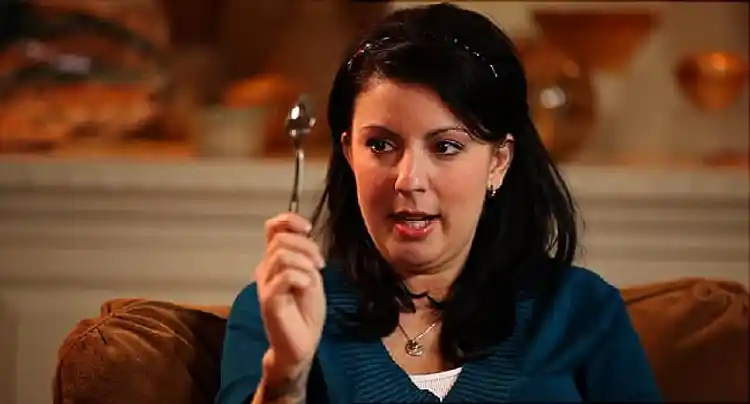Lupus Secret Language

Hide Video Transcript
Video Transcript
CHRISTINE MISERANDINO
Hey, come on in. Nice to meet you. I'm so glad you came over. Let's move over here. Oh, wow. Look who's here. How are you doing today, Kim? KIM SCHOFIELD
I'm good. CHRISTINE MISERANDINO
How are you doing? STEPHANIE KENNEDY
I'm fine. CHRISTINE MISERANDINO: I'm feeling fabulous, and that's what I said this morning when my husband called. How you doing? Good. I'm feeling fine. How are you really feeling?
KIM SCHOFIELD
Really? My legs hurt. My knees, my joints are hurting. I feel awful. But not everybody understands. By the time you get done explaining it, you're exhausted. And if you say the same thing over and over and over again, who wants to-- who really does want to hear it? So it's easier to just say, I'm fine. CHRISTINE MISERANDINO
Fine. I'm doing good. I'm fine. And then I realize when I'm saying I'm fine to everyone, their fine is different than our fine. KIM SCHOFIELD
Right. STEPHANIE KENNEDY
Absolutely. What we feel and what we say is our own language. KIM SCHOFIELD
It's the lupus language. And I try to tell people, you know, have you ever had the flu? You know when you feel achy, and you're tired? You want to pull the covers all up over your head and just say, leave me alone? Well, you know what? Your worst day is my best day. I feel like I have the flu every single day, but it doesn't get any better. No one explained that it would be this intense every day. CHRISTINE MISERANDINO
It's almost like this secret society of the sick. We know the code words, and I can look at you and go, no. Not doing good. But I feel like you'll understand that better than my friends. STEPHANIE KENNEDY
You know, I don't think it's even limited to friends. Unfortunately, family members, as much as they love you and you love them, and they see you on a daily basis, sometimes they don't even get it. CHRISTINE MISERANDINO: I was in college, and I was talking to my friend at the diner. And she said to me, you know, what does it really feel like? And I said to her, you know, here. Here's some spoons. Follow my day. And she said, well, you get up and you go out. And I'm like, whoa, whoa, whoa, whoa, whoa. So come on, girls. I get up, and I open up my eyes. I'm running late, and I feel my body is in pain. Then I crawl out of bed. It's not I jump. It's I crawl out of bed.
KIM SCHOFIELD
You have to decide what you can put on, because exactly can I tie this morning? Can I button this morning? Can I zipper this morning? CHRISTINE MISERANDINO
Can I button the cardigan? KIM SCHOFIELD
What can I do? CHRISTINE MISERANDINO
Oh, wait. We have to make something to eat. We can't skip breakfast. KIM SCHOFIELD
No, no, no. CHRISTINE MISERANDINO
Because-- KIM SCHOFIELD
You've got to take your medication. CHRISTINE MISERANDINO
You have to take your medicine. STEPHANIE KENNEDY
You wake up, and before you even open your eyes, you know it's raining. KIM SCHOFIELD
Oh. STEPHANIE KENNEDY
It's raining. CHRISTINE MISERANDINO
Wait, wait, wait. STEPHANIE KENNEDY
You haven't even seen the rain. We know it rains. KIM SCHOFIELD
But you know the rain. STEPHANIE KENNEDY: Because your body is telling you that it's raining.
CHRISTINE MISERANDINO
Because I really-- if it's raining, it's gone. I felt like these became my English to lupus translator, because all of a sudden, she realized, wait a minute. I wasn't thinking about all these things. And when you say fine, you don't mean fine. And when you walk in looking cute, I'm not seeing the black and blues under your jeans. KIM SCHOFIELD
And you're not seeing the energy that it takes me to complete a sentence, because in my mind, I hear it, but I can't get it out. You're not seeing that. CHRISTINE MISERANDINO
That's the beauty of it too that we get, that we can start our day with this, and you did a conference. And they're gone. KIM SCHOFIELD
And I'm done. And there are some times when just a 15-minute nap will help me to get one spoon back, and that's all I have for the day. CHRISTINE MISERANDINO
Exactly. KIM SCHOFIELD
And some days it's enough, but then there are those days, Christine, where it is just not enough. And I've given everything I can, and no one seems to understand what it's like to live with spoons. CHRISTINE MISERANDINO
I learned what was important. You know what? The dishes in the sink will be there, but tonight my daughter has a cough, and she needs me to take care of her. Tonight I want to be a mom, and tonight I want to be normal. KIM SCHOFIELD
Yes. CHRISTINE MISERANDINO: I want to be your mom, and you know what? Normal to everyone else is not normal to us.
STEPHANIE KENNEDY
We sat here and laughed, because you're OK, and I'm fine, and you're great. And we know we're not, but you have to be honest with those around you, whether it's your family members, your friends, your coworkers, because they don't know. They don't live our lives. They don't know when we say we're fine that we're not. CHRISTINE MISERANDINO
They can't read our minds. STEPHANIE KENNEDY
Absolutely so. I have learned that if I want people to understand and kind of put themselves in my shoes, I have to be brutally honest sometimes about how I feel. And for me, that has been the hardest part of this journey that I have been on is putting myself out there and letting everyone know that I'm not fine, that I'm not OK. KIM SCHOFIELD
And there's a good side, a bad side, and an ugly. CHRISTINE MISERANDINO
Right. KIM SCHOFIELD
When it's good, it's good, and when it's ugly, it is ugly. But the good thing about this is that you are able to express yourself and say, you know what? Today is just not a good day. It's a loopy day. And so then I find that I start guarding my spoons and taking them back, and then people will trying to snatch them. And I'm, no, no. This is all I have today. This is mine. This is our world. This is our world. It's not the end of the world. It's just the beginning of a new way of living. CHRISTINE MISERANDINO: Absolutely.
